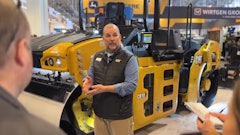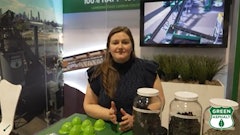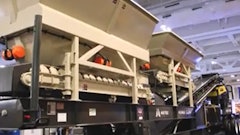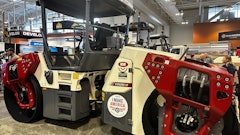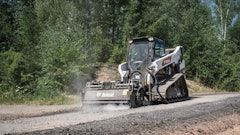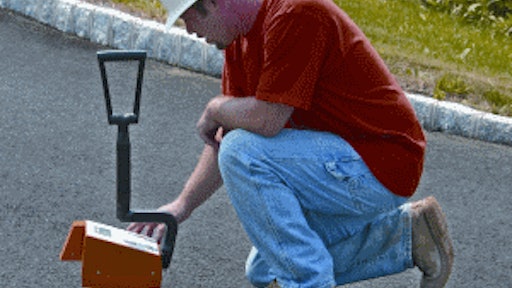
It's no secret that going "green" is gaining momentum within the asphalt industry just as it is within other industries around the country. Increasing reclaimed asphalt pavement (RAP), incorporating a percentage of shingle content (new rejects or old tear-offs), adding crumb rubber (recycled tires), and producing warm mix lowers the cost of maintaining quality road systems and reduces the consumption of valuable resources, including aggregates and petroleum.
Being green is good for road agencies and taxpayers who want to keep costs down and for government agencies that want to do their part as environment stewards. The above new mix designs presumably deliver the same quality performance as virgin hot mix, but the question is at what expense. Do the asphalt plants, for example, have to reconfigure their operations and technology to accommodate "sustainable" asphalt and are test equipment manufacturers confident that current technology can ensure that all pavements are created to perform equally.
RAP not an issue
From both the plant and testing perspectives, reclaimed asphalt pavement poses few if any challenges. Used at least once already, RAP should have all the right ingredients to make another quality road. The same cannot be said for shingles, especially the tear-off variety, say automation manufacturers.
Systems Equipment Corp. and WEM Automation both provide the computer technology -- the controls, software, and systems -- to automate plants. "The challenge with singles, especially tear-offs, is that one must continually know the amount being added," says Systems Equipment's Dave Enyart, Sr. "As a rule, shingles have high oil content. If the plant cannot get a handle on this material flow, it cannot regulate the asphalt content of the mix.
Enyart gives this example. "Let's assume you're making 100 TPH of mix with a desired mix AC content of 5 percent, using 80 TPH of virgin material and 20 TPH of recycle material with 5 percent oil content. If we replaced 5 percent of the recycle material with shingles, having an oil content of 20 percent, any change in the shingles rate makes a big AC content swing in the end product.
"Our job is to provide automation and plant hardware to assist in accurately monitoring any changes in the shingles rate. Integrating this information in a timely fashion allows for a consistent final product."
As he points out, the automaton and systems can handle the variety of recycled material if there are few surprises. James Phillips, vice president of construction for WEM Automation agrees. "The automation can handle the variety. It can program the plant equipment to run RAP with a 5 percent oil content and shingles at 40 percent. What it cannot make up for is inconsistency."
The other challenge, he adds, is within the plant itself. "As automation specialists, we have to work more closely with plants to ensure they have the right feed systems and other equipment in place to run the recycled material. A plugged or slowed feeder line running recycled material, for example, can mess up a mix in a hurry. To avoid this, plants need to have the best equipment in the best shape possible."
Phillips and Enyart are convinced that the recycle trend is not a fad because it saves on costs, energy consumption and valuable resources. Whereas tear-offs present some difficult challenges from a production point of view, the recycle movement as a whole has been and will continue to be well received. Phillips is equally enthusiastic about the prospects warm mix brings to the table.
"Warm mix is becoming more popular and is here to stay," he emphasizes. "Plants use approximately one-third less energy to produce warm mix versus hot mix and it has proven to be very workable at the job site."
If there is a challenge, though, it's on the testing side, according to one gauge manufacturer.
Not ready for prime time
"Sustainability is moving ahead of testing technology," relates TransTech Systems president and CEO David Apkarian. Among a long list of products and services, TransTech Systems manufactures the Pavement Quality Indicator, a non nuclear gauge designed to measure asphalt density, temperature, and moisture content.
"The industry has the technology to perform accurate lab and field tests on asphalt made with asphalt-based shingles, crumb rubber, RAP, and steel slag, among other recycled materials," he explains. "Warm mix, however, is another story. The issue is the amount and type of additives used."
"Warm mix comes out at a lower temperature than hot mix, 230 degree F versus 300 degrees F. Because of this there is less off-gasing and it's more economical for plants to make. Warm mix is also easier to work with." All of this is good, he says, except one detail. Plants have to put additives in the warm mix to make it viscous at lower temperatures. The additives create the challenge.
"As a gauge manufacturer, we don't always know what additives are being used or what they will do to gauge readings, and we need to know what to measure and adjust accordingly to feel comfortable about the results. This is not Star Trek and we don't use tri-corders on the asphalt."
Apkarian is confident that his company and others can develop the right measuring tools for warm mix, but they need more information about the additive content and what it does to gauge readings. "Currently, we have the technology to test Double Barrel Green warm mix and other warm mixes have undergone limited successful testing, he adds. "Warm mix holds a lot of promise and is currently right for applications on secondary roads, but it's not ready for prime time on our highway systems."
Like Apkarian, Dick Reaves, North American Sales Manager for Troxler Electronic Laboratories, Inc., says that most recycled materials pose few if any challenges for current testing technology. Troxler's extensive line of testing equipment includes a wide range of nuclear moisture density gauges and PavTracker Plus, a non nuclear gauge for the field, along with gyratory compactors, asphalt ignition ovens, and nuclear asphaltcontent gauges for the lab.
"RAP, shingles, and crumb rubber don't adversely impact in-lab testing for mix design, quality assurance, or quality control," he explains. "The same can be said for most field compaction control tests. However, there may be issues with warm mix, more specifically with additives that may add water to the mix, which, may affect readings."
Time will tell, adds Apkarian. "The industry wants to make some necessary changes that will lower the costs associated with paving roads and help the environment. From a test equipment manufacturer's viewpoint, though, we need to be brought into the loop early on to ensure that current technology will get the quality-control job done, especially for all the variations of warm mix. "
The challenges are different yet similar for both the plant automation experts and test equipment manufacturers, and they begin and end with knowledge. Computers can handled the wide variety of recycled material going through a plant, if they know the makeup of the material. Lab and field test equipment can provide accurate test results, if their manufacturers have full knowledge of what's being tested. The goal is the same for all industry participants. Tomorrow's roads may not be created equally, but they will all have to meet and perform to the same high standards. ƒÞ
Specializing in the construction industry, Rod Dickens is a freelance writer based in Neenah, WI.













